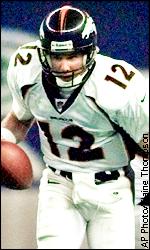 |
|
| | Monday, November 22 | |||||||||||||
Special to ESPN.com | ||||||||||||||
| Their 3-7 record might elicit a different opinion, but the Denver Broncos are playing much better football than they were six weeks ago when they defeated the Oakland Raiders in their first meeting.
Rookie Olandis Gary has given the Broncos a solid running attack. But looking at tape of the loss in Seattle, there were situations when if Terrell Davis were on the field, the Broncos would have had some big plays and maybe even touchdowns because Davis is such a special back. The offensive line has performed at a high level thanks to Alex Gibbs, one of the game's best line coaches. He knows how to make five linemen play as one unit, picking up stunts, slants and blitzes. They are not making many mistakes. However, the NFL's rule change regarding cut blocks has slowed the Broncos' line from sealing the back side on running plays. The change has affected their offense, preventing the linemen from opening up cutback lanes for Gary. But the biggest dilemma for the Denver offense has been the absence of Shannon Sharpe, the catalyst for their formation variations. With Sharpe out, Denver is not using the aggressive approach it has in the past. The Broncos offense is more basic, which is understandable considering the inconsistency they have had at quarterback and running back. Sharpe is a hybrid -- not a tight end, not a receiver -- and he always presented matchup problems for the defense.
As for the Raiders, the key is a healthy Rich Gannon. They are a shadow of what we all remember of the Raiders' vertical game. They are now a West Coast offensive team under Jon Gruden, seldom throwing the ball down the field. They focus on short, quick drops by Gannon and getting rid of the ball quickly. They have managed to achieve good offensive balance. Gannon is distributing the ball to a variety of receivers, and the running game has thunder and lightning with Tyrone Wheatley and Napoleon Kaufman. Rickey Dudley has been average at tight end, and he needs to get more involved in the passing game, particularly in the West Coast offense, which relies on the tight end. Oakland's shaky offensive line has yet to display the consistency it will need against the Broncos and the plethora of zone-blitz schemes. Defensive coordinator Greg Robinson loves to attack the line of scrimmage and the quarterback. The Raiders' line must be sharp physically and mentally because of the looks they will see from the Denver defense. Here are the keys to Monday night's matchup for both teams:
Oakland Raiders
2. Offensive efficiency: The Raiders need to try to gain at least four yards every time they run the football. A lot of teams look at average per carry as an important statistic, but I would concentrate more on efficiency running the ball. Some teams might run the ball 20 times and gain 100 yards, but 19 of those plays made 20 yards and they had one 80-yard run, so everyone thinks they had a great offensive day. That's incorrect. To be efficient, the Raiders need to keep the Broncos out of their nickel and dime packages. To keep the Broncos' base defense on the field, they must run the ball efficiently. 3. Pressure Miller: Miller played very well against Seattle, especially for a player who had been out of football for four years. The Raiders need to get in his face, break him down and don't let him get comfortable. The Seahawks let Miller get comfortable in the second half. Russell Maryland and Darrell Russell will give the Raiders a push up the middle, but defensive end Lance Johnstone needs to provide quick pressure from the outside. He needs to make Miller flinch and move in the pocket.
Denver Broncos For an effective play-action passing game, it's not necessarily true that the running game has to be working. If you are committed to running the ball, and the other teams are aware of that commitment, you can get play-action on the first play of the game. I've seen that 100 times this year. The Broncos need to attempt the play-action. It could almost help the running game by throwing the football. That might be the biggest key in this game. 2. Coghill must be a cog: When George Coghill replaced the injured Eric Brown at free safety, he struggled. The Broncos need better play from Coghill against the Raiders' wideouts or they will be in trouble. When Seattle quarterback Jon Kitna brought the Seahawks down the field on the game-winning drive, Coghill got beat for the touchdown and another big play during that drive. The Broncos need better play at free safety, which is why -- again -- the Raiders need to attack down the field. Brown, out for the season with torn knee ligaments, was having a great season, getting better every week. He was a ferocious hitter and a solid coverage player. It was clear that the Broncos suffered defensively when Brown left the game. 3. Mush rush: I don't think Rich Gannon has the arm strength to just wing the ball down the field and beat the Broncos consistently. What Gannon likes to do is move out of the pocket. He is not the prototypical NFL pocket-passer. When he feels pressure, he will move out of the pocket. Denver will have to use the mush rush -- plodding up the field, maintaining passing lanes and denying Gannon places to go. If he is going to beat Denver, the Broncos must force him to beat them from the pocket.
Former NFL quarterback Ron Jaworski appears each week on ESPN's Monday Night Countdown and Edge NFL Matchup. He breaks down the Monday Night Football matchup each week on ESPN.com. | ALSO SEE Week 11 previews
Kreidler: Raiders finally Rich at QB
Raider reversal: Broncos called dirty
Playbook: Raiders' bunch right scat right Y flat
 | |||||||||||||


 War Room preview: Raiders at Broncos
War Room preview: Raiders at Broncos